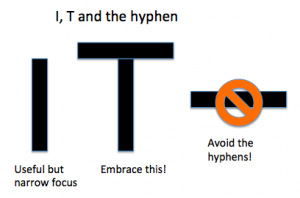Last week I was at a strange meeting: Three guys in a room asking me a number of questions about how I hired talent into my team. I told them I typically look for T-shaped people. The audience composed of hyphenated types (will explain in a bit what that means) didn’t get it. So I shared what I learned and my own interpretation of the well known definition for T-shaped people types and a few others. Since then I’ve scribbled it in cocktail napkins more than three times this past week explaining to a friend or colleague the same subject. At this point a revisit of the topic in a blog post is overdue. So here it is…
T-shaped, I-shaped, hyphenated and A-shaped…what do they all mean?
 If you Google or lookup Wikipedia, you’ll find plenty of links on the subject (see Wikipedia for T-Shaped skills). The CEO of design firm IDEO is a well known advocate and adopter of recruiting people with T shaped skills. There’s even a book on the subject of T shaped people sparking creativity and innovation. Here’s a topical summary of the subject of people types and shapes nevertheless.
If you Google or lookup Wikipedia, you’ll find plenty of links on the subject (see Wikipedia for T-Shaped skills). The CEO of design firm IDEO is a well known advocate and adopter of recruiting people with T shaped skills. There’s even a book on the subject of T shaped people sparking creativity and innovation. Here’s a topical summary of the subject of people types and shapes nevertheless.
I-shaped people types are those that have a very narrow, but expert domain skills in one specific area. A researcher who has spent his entire life in science in one area is more like an I-typed person. These are the people that can solve a problem like a ninja – focus and specificity.
T-shaped people types are those that not only have the strength of a specific domain area (i.e. the I-shaped), but a broad set of other domain skills too to collaborate and build things with others.
If you are exceptional with two domain specific skills, and have broad cross domain skills as well, you fit in the A-shaped type. (A modern day Da Vinci or polymath)
Hyphenated people type is for those that have no specific domain skills of full competence, but have a broad range of skills across domains. Examples of hyphenated people types include career project managers or general managers at large organizations who have never built anything but a project plan.
So why know or understand these people-shape types?
The first reason for the above is to figure out what kind of an organization you are in and where you’d be better suited to be at. Startups for example need to have lots of T-shaped people because there’s no place in a startup for a hyphenated person – dollars are scarce, time (to market) is usually short, and if you want to attract outside investment, you better have an A-class team. Stellar professional services firms too develop their teams this way – where you have a lot of domain experts with specific industry knowledge, sometimes in more than one area, and can operate across domains.
Contrast that with working in a large stodgy firms. Over time, the same people that have risen through the ranks to executive positions, either loose focus on what got them there (their I’s) or fail to develop new I’s and simply become hyphenated people. And that breeds a culture of more hyphens throughout the organization as they start to hire or encourage and retain more hyphens. Quickly, this can lead to a culture of mediocrity where domain knowledge disappears and the organization simply fills itself with groupthink.
The second reason is to assess and plan your own career development. If you are an I type today, you could plan to expand on your domain knowledge and become more well rounded in other domains and become the T-type. If you are a T-type, your stretch goal is to get to an A type polymath (here’s a recent HBR post on the value of being a polymath now). If you are a hyphenated type, it is time to spend the time learning and practicing a craft.
There is a third reason outside of planning your own career development or knowing which type of organization would best serve your needs. And that is figuring out where to compliment your own team by developing your team, including yourself, or hiring the right set of people in your team. Few people recognize or master this concept. Insecure managers often have difficulty hiring smarter talent because they feel threatened by that while smart managers embrace talent to challenge the status quo in their otherwise or soon to be mediocre organization.
This is particularly important for product managers and what separates them from being or becoming hyphenated project managers. Product managers that collect tasks around the room, track status or relay information amongst product development teams will perish if they don’t have deep domain skills or broad cross domain skills. Because, product management is a strategic T-shaped role. As the folks at Pragmatic Marketing would say, Own it, no excuses.
A couple of years old but still relevant: IDEO CEO Tim Brown: T-Shaped Stars: The Backbone of IDEO’s Collaborative Culture
– Prabhakar Gopalan(@PGpopalan)
Tweet this: New post by @PGopalan Reviewing T-shaped skills and more http://wp.me/pXBON-3ge #onpm #people #culture